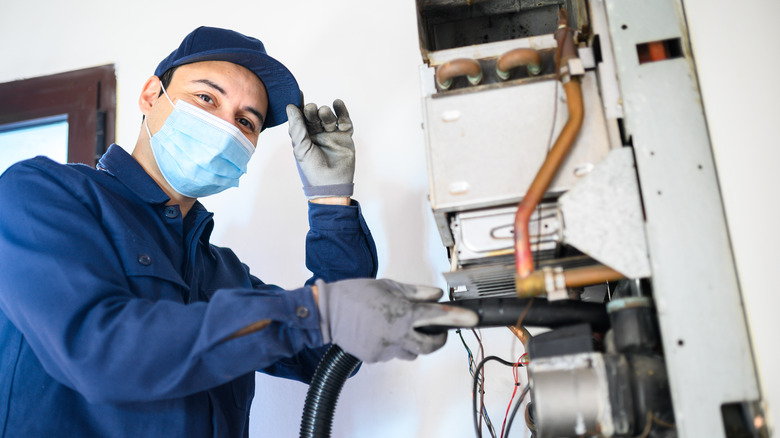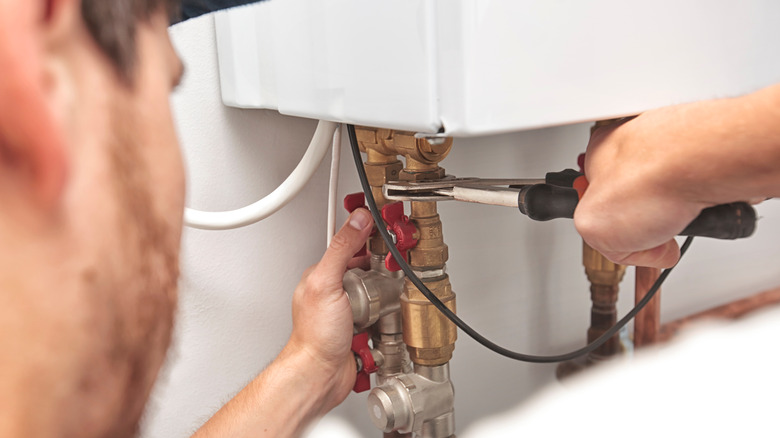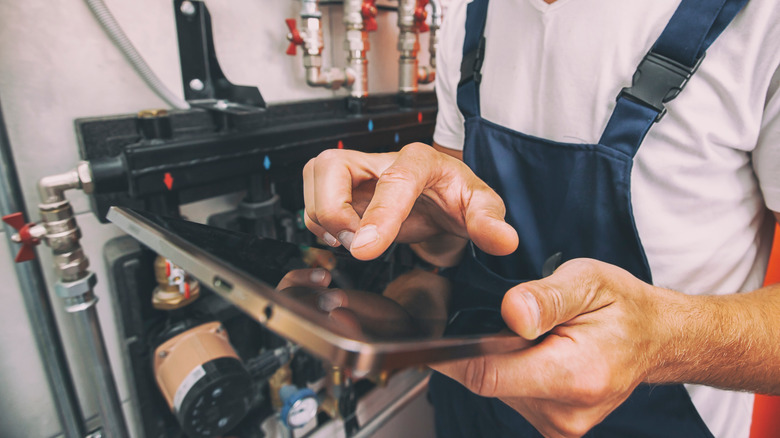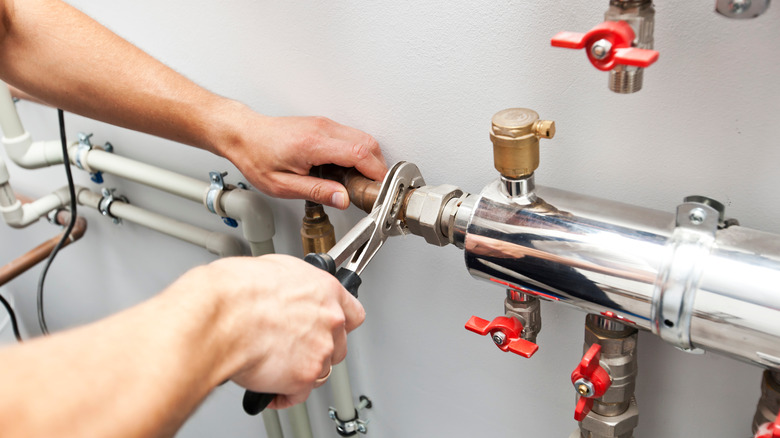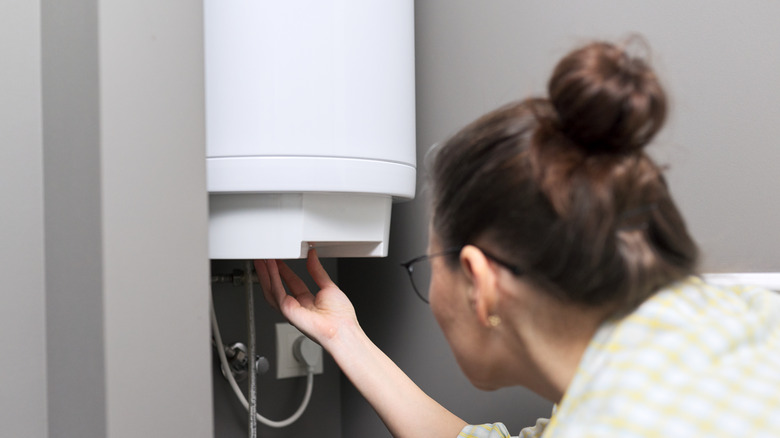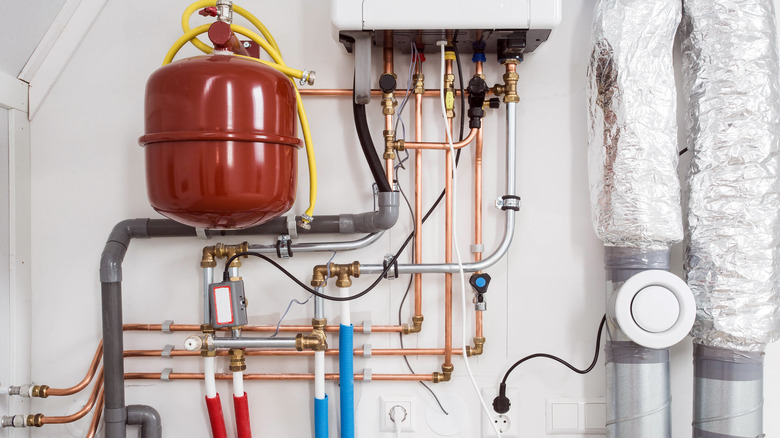How Much Does It Cost To Install A Water Heater?
Hot water is vital in any household today. Imagine having to wash the dishes, take a shower, or even wash your clothes without hot water. Access to hot water is so common that we don't even realize its importance until our water heater breaks down and we are suddenly without. As it's often taken for granted, hot water heater maintenance ends up at the bottom of our priority lists, and we can only regret not taking better care when things start malfunctioning.
There is no doubt that the water heater is an essential element for every household, so whether you are looking to choose a new water heater or replace an old unit, you ought to know the cost implications. According to HomeAdvisor, the cost of replacing a water heater falls anywhere between $829 and $1,636 for the unit and labor, and additional plumbing services can run from $45 to $150 an hour. Read on for a detailed breakdown of everything that goes into the pricing of water heater installation.
Factors affecting the cost of installing a water heater
It is worth mentioning that a significant portion of the overall cost is the price of the water heating unit itself. However, there are other factors that come into play and will determine the total price tag, as detailed by This Old House.
Size of the water heater
The size of a water heater is usually determined by how many people the tank can serve. For instance, a 40-gallon water heater is enough to take care of the needs of a two-person household. Remember, larger units with more capacity cost more than their smaller counterparts. While a 40-gallon water heater costs around $320 to $1,600, an 80-gallon water heater should cost anything between $1,000 and $3,000.
Location of the heater in the house
The installation location is another factor that heavily influences the overall cost of labor. Difficult-to-reach areas like the corner of the attic or down in the basement will increase the labor cost since the technician will have to carry the equipment up or down a flight of stairs or work to get into the tighter corners of your home.
Materials
The material needs are determined by the type of water heater and the specific location of the unit. Some of the common materials necessary during installation include pressure valves, pipes, and vents, not to mention plumbing tools. Some technicians might inform you of additional material costs when installing the water heater in a hard-to-reach place or an otherwise unconventional situation.
The type of venting system
Ventilating the water heating system can be achieved in two ways: direct venting and power venting. A power ventilating system operates on a series of motorized fans to direct the gases away from the house, and this costs significantly more than a comparable direct venting system. Direct venting uses a horizontal piping system designed to passively allow the gases to flow away from the house. When it comes to pricing, power venting systems may cost you up to $1,000 more than direct venting systems.
The type of the water heater
Today, water heaters either run on electricity or gas. Gas-powered options are more expensive up front, but less so in the long run because gas power is cheaper than electricity. Regarding the type of unit, the two most popular options are tankless and tank models. Tankless models are smaller in size to save space, but more expensive than tank models. What's more, the installation process for the tankless models is more complicated, so you should also expect higher labor costs if you decide to go that route.
Additional costs
Similar to any other installation or repair work around the house, you should always be prepared for additional costs. When it comes to water heater installation, some of the other additional costs might be a result of the following:
Disposal of the old unit
This factor applies when you are replacing your old unit with a new one. Most of the time, the cost to dispose of the old unit is not necessarily included in the standard contract. Stahl Plumbing, Heating & Air Conditioning explains that in such a scenario, you will have to find a disposal service company to handle the task and pay them for their services.
Carpentry work
In some circumstances, the installation process might require additional carpentry work either to reinforce structural elements or to create space for a larger unit. Extensive work may require hiring a carpenter in addition to a plumber, and this will only add to the overall labor cost, according to This Old House.
Fixing existing leaks
Fixing any leaks is a standard practice performed by most reputable plumbers. For extensive leaks that take extra time to repair, you will likely end up with additional labor costs for the plumber's time.
Drain Cleaning
Over the years your drain may accumulate debris that reduces the efficiency of your plumbing system and causes the movement of wastewater from your taps or shower to slow down. As with other additional repairs, unclogging the drains will require additional time and thus additional expense.
Types of installation and repair services
Plumbing companies usually offer both water heater installation and repair services. Installation duration and costs largely depend on the type of water heater model, but according to Modern Plumbing Industries Inc., common repairs across all types of units include the following:
Restoring broken dip tubes
The main function of the dip tube is to transport fresh water from the municipality right to the bottom of the water heater tanks where the heating element is. When the dip tube breaks, fresh water will not be delivered at the bottom but will instead mix with the heated water at the top of the tank. This causes a sudden shortage of hot water supply in your house, but luckily it is an easy fix.
Replacing a malfunctioning heating element
Most tanks have two heating elements in the tanks that are responsible for keeping the water in your home at the right temperature. When one element breaks down, the water temperature will drop significantly, evidenced by issues such as lukewarm water from your tap. Thankfully, it is an easy fix that a technician can complete within a day.
Fixing a broken burner
A burnt-out burner is a common problem in gas-powered heaters. The accumulation of dirt and rust on the burner surface gets in the way of gas delivery and thus blocks the ignition mechanism. It is also possible to experience reduced gas delivery to the burner because of blockages along the gas line.
Why do you need to install a water heater?
Water heaters are an invaluable appliance in every household. Other than making everyone's life more comfortable, are there additional reasons you should install a water heater in your home? According to SPS Plumbing, the answer is yes, and here's why:
Energy conservation
Modern units have improved energy conservation features that you ought to take advantage of. Replacing your older unit with a more energy-efficient alternative may have a high initial cost, but the change will definitely save you costs on your energy bills down the line. Energy-efficient water heater options include tankless models or solar-powered options.
For a constant supply of hot water
If your older unit is always cutting off the hot water supply, then it is time to look for other options that will guarantee your home a constant supply of hot water. No one wants their hot shower cut off, regardless of how long the shower takes.
To reduce the risk of water damage
Even the top hot water heaters can only work for so long. On average, the shelf life for most units is between 6 and 10 years. It is ideal to replace your unit before it starts breaking down and leaking, as these problems can grow to cause flooding and water damage to your home.
Benefits of professional installation
It is essential to mention that hot water heater installation and repair is not a DIY project. It requires specific skills and experience to complete successfully and is a job left best to the professionals. According to Putman & Sons Plumbing, here are some of the benefits of leaving this project to the pros.
Proper installation
When certified professionals do the installation on your behalf, you can rest assured that the installation is done correctly. You don't want to have to deal with unnecessary repairs and water damage that might result if the water heater is improperly installed. In extreme cases, you might end up having to replace the whole unit if things weren't executed correctly right from the jump.
Save yourself time and stress
If ever your water heater breaks down, you will not want to have to deal with the problem and go without hot water any longer than you have to. Professionals have the skills and expertise to diagnose and fix the problem in the shortest time possible. Regardless of the type of water heater, installation should be completed the same day.
